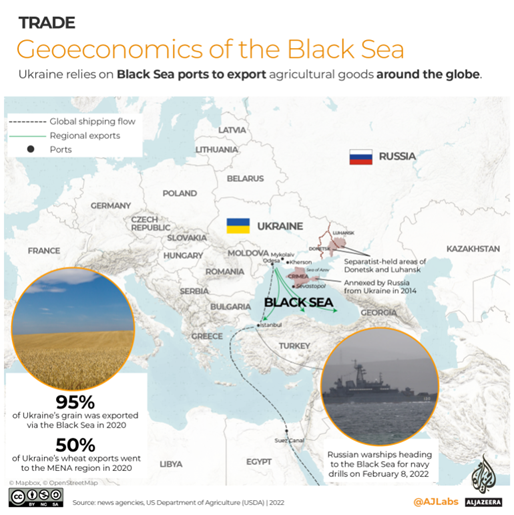

8th November 2022 (6 Topics)
Context
Recently, Russia re-joined the Black sea Grain deal which has drawn attention to the significance and impacts of the deal on Global food supply chains where India is also looking forward to the deal’s inception.
About
About the Black Sea Grain initiative:
- The deal was mediated by the United Nations (UN) and Turkey.
- The deal was to provide a safe maritime humanitarian corridor for Ukrainian exports (particularly for food grains) from three of its key ports, namely,
- Chornomorsk,
- Odesa and
- Yuzhny/Pivdennyiin the Black Sea.

- It aims to tackle rising food prices due to geopolitical conflict.
Joint Coordination Centre (JCC):
- The deal put in place a Joint Coordination Centre (JCC), comprising senior representatives from Russia, Turkey, Ukraine, and the UN for oversight and coordination.
- All commercial ships are required to register directly with the JCC to ensure appropriate monitoring, inspection, and safe passage.
Significance of the deal:
- As, Ukraine is among the largest exporters of wheat, maize, rapeseed, sunflower seeds, and sunflower oil, globally.
- As well as its access to the deep-sea ports in the Black Sea enables it to directly approach Russia and Europe along with grain importers from the Middle East and North Africa.
- Amid the Russia-Ukraine crisis, exports were hit hard for a year and affecting the global supply chains.
- This deal is seen as a facilitator for food supplies and can reduce inflation and lead to a decrease in food prices.
Do you know?According to the European Commission, Ukraine accounts for 10% of the world wheat market, 15% of the corn market, and 13% of the barley market. With more than 50% of world trade, it is also the main player in the sunflower oil market. |
Why is it important for other Countries?
- Global facilitator of grains: As per the UN Office for Coordination of Humanitarian Affairs, approximately 1 million tonnes of grains have been shipped since the initiative commenced.
- To address the increasing food prices: The UN Food and Agricultural Organisation’s (FAO) Food Price Index, which assesses the monthly change in international prices of a basket of food commodities, fell for the sixth consecutive month in a row during the September assessment period.
- Strategic location for trade: About 44% of the shipments, which include corn, wheat, rapeseed, and sunflower oil among others, reached high-income countries (including Spain, Netherlands, and Italy among others), 28% reached low and lower-middle-income countries (Egypt, Iran, Sudan, and Kenya among others) and 27% reached upper-middle-income countries (China and Bulgaria among others).
What would have happened if the deal has not been commenced?
- An increase in the prices of Food grains can further escalate inflation and the Global food crisis.
- Lower-middle-income countries like Egypt, Iran, Sudan, and Kenya would have suffered more.



